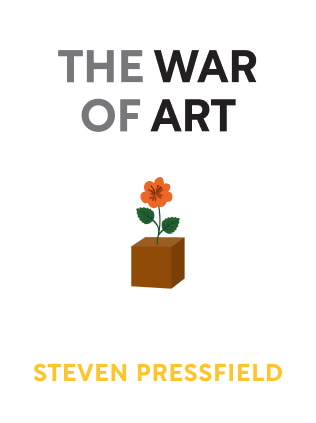

This article is an excerpt from the Shortform book guide to "The War of Art" by Steven Pressfield. Shortform has the world's best summaries and analyses of books you should be reading.
Like this article? Sign up for a free trial here .
What causes the fear of writing? How can understanding your fears help you to write more often and succeed creatively?
The fear of writing is something many aspiring writers face, whether it’s due to self-doubt, or the prospect of failure. Fear can be a powerful obstacle to achieving your dreams and ambitions, which is why it’s important to understand and overcome them.
Find out more about the fear of writing below.
The Fear of Writing, Explained
Do you feel a calling inside to write or inspire the world? Do you struggle to follow that calling because of doubt, fear, or lack of motivation? The War of Art by Steven Pressfield spells out the reason you struggle to reach your dreams and provides strategies to help you overcome the obstacles. Each creative person experiences resistance in the form of fear when they approach their true work. When you understand where that fear comes from, how it manifests in your life, and how a commitment to your work can give you the strength to push forward, you will be successful in living your dreams.
What is the fear of writing about and why do you let it control you? Fear, as detrimental as it is to your progress, is comforting. You’re used to living with it, and if you’re honest, you have to admit that it’s easier to do nothing out of fear than put your heart on the line for what you believe in.
The most common fear encompasses your relationship with the external world. What will people think of you if you seek internal fulfillment? You’re afraid you will lose your tribe. You’re afraid of failing and the humiliation that comes with it. You fear a loss of financial or social stability. You’re afraid of wasting your time, which you believe is finite. You’re afraid of the “I-told-you-so’s” from people who don’t understand your dreams. You fear finding out you’re a fraud or not capable of living up to your calling. You’re afraid to find out you’ve been wrong about your calling.
These are valid fears, but they’re not the main fear that halts you in your tracks like quicksand. You never talk about this fear, not even to yourself. This fear is the fear of succeeding.
What happens if you gain your full power and become the person you believed you were? If you discover you do have talent, drive, and passion and can achieve your goals, will you be able to live up to it? The pressure is now on for you to be that person and stay enlightened in the higher plane.
Also, you fear success will make you lose the life you’ve grown accustomed to. The truth is, you will lose some or all of that life. And that’s not a bad thing. The parts of your life that are true will continue to support you in your new fulfilled soul. The ones that drop away are not the parts you need. You can’t change who you are meant to be. Once you become that person, the life you’re meant to lead will open up to you and will include people and environments with which you truly belong.
Example: Steven Pressfield
When Steven Pressfield decided to write his book The War of Art, the voice in his head criticized the decision. He was a fiction writer, not a nonfiction writer. He would fail at his attempt to expose resistance and the related principles. The voice also said he wasn’t a true authority on resistance, and claiming to be would ruin his career. The voice told him he would come off as vain, untrustworthy, and conceited.
Pressfield was scared and nervous. The voice presented some good arguments, for which he had no comebacks. He started to develop symptoms of resistance and became unhappy. The only thing that made him feel better was thinking about writing this book. He decided to push through the resistance and start to write. Once he did, the fear of writing dropped away, the voice faded, and he was able to finish.
Exercise: What Role Does Fear Play in Your Life?
Fear is a powerful emotion capable of stopping you in your tracks. Now that you know how this fear works, how does that change the way you see its role in your life?
- Name one thing you wanted to do that you didn’t due to the fear of writing.
- What did you fear the most and why?
- What were two symptoms you experienced because of this fear? For example, did you procrastinate? Seek self-soothing behaviors?
- What internal consequences of giving in to your fear of writing did you notice? For example, did you feel anxiety or shame you couldn’t explain? Discontent?

———End of Preview———
Like what you just read? Read the rest of the world's best book summary and analysis of Steven Pressfield's "The War of Art" at Shortform .
Here's what you'll find in our full The War of Art summary :
- Why creative people feel resistance when approaching their true work
- How to break down the wall that holds you back from reaching your potential
- How to tap into your creative power and honor the genius you were born with






